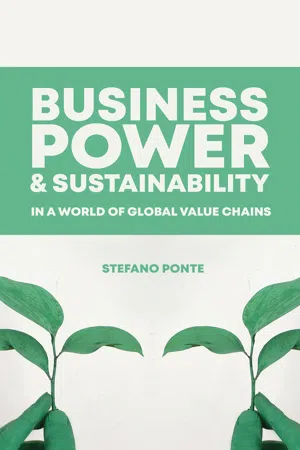![]()
1 | WHAT WE KNOW ABOUT SUSTAINABILITY GOVERNANCE
Until fairly recently, much of the existing work in international political economy that deals with environmental issues was focused narrowly on international agreements, institutions and regimes. This included research on how international economic regimes and institutions (such as the WTO) addressed environmental issues, and research on the economic provisions of international environmental governance initiatives (such as carbon markets). But research on the rise of private and hybrid governance initiatives has now emerged, addressing its political, economic and environmental interfaces (Clapp and Helleiner, 2012). In this chapter, I highlight the main features of key literatures that can help unpack the mutual relations between sustainability governance and the sustainability elements that shape the governance of GVCs. I start with a review of the transnational sustainability governance literature, followed by a more detailed analysis of research on multi-stakeholder initiatives (MSIs) on sustainability. Then I reflect on the business school literatures on self-regulation, strategy and corporate social (and environmental) responsibility. These reviews highlight that current understandings of the multilayered and complex nature of sustainability governance are limited by a lack of mutual engagement between researchers embedded in political science, environmental politics and international political economy, on the one side, and business studies, on the other side. In Chapter 2, I will build upon these reflections to construct a framework that embeds sustainability issues in the analysis of power, governance and upgrading in GVCs.
Transnational Sustainability Governance
Transnational sustainability governance consists of ‘transnational actors operating in a political sphere in which public and private actors interact across borders and political jurisdictions’ to address environmental concerns (Andonova et al., 2009: 69). It is fragmented, multilayered, characterized by a hybrid of private and public authority, and takes place through different kinds of partnerships – frequently involving the steering of networks to achieve public policy goals (Andonova, 2010; Andonova et al., 2009; Bäckstrand, 2008; Haas, 2004). Numerous transnational experiments and entrepreneurial governance initiatives are being carried out by cities and their networks, industry associations and individual corporations, international and local non-governmental organizations (NGOs), and other non-state actors at different spatial levels and across jurisdictions (Abbott et al., 2016; Bulkeley et al., 2012; Dingwerth and Pattberg, 2009; Green, 2013, 2017a; Hoffmann, 2011; Overdevest, 2010; Overdevest and Zeitlin, 2014, 2018; Ponte and Daugbjerg, 2015).
The changing shape of transnational sustainability governance has been a key academic and policy concern in the past two decades, as part of a wider debate on the putative advance and limitations of ‘private authority’ in governing economy, society and the environment (Bartley, 2018; Cutler et al., 1999; Hall and Biersteker, 2002). Many contributors have highlighted the emergence of market-based forms of authority (Bartley, 2007; Büthe and Mattli, 2011; Cashore et al., 2004; Pattberg, 2007) and have shown that this development has not led to a withering away of the state (Auld, 2014; Bartley, 2014; Gale and Haward, 2011; Gulbrandsen, 2010, 2014). Rather, we are witnessing the birth of hybrid governance forms where business, civil society and public actors interact at different levels, in parallel and intersecting arenas where domestic and international legal orders can also apply (Abbott and Snidal, 2009a; Andonova et al., 2009; Bäckstrand, 2008; Bair, 2017; Levy and Newell, 2005; Ponte and Daugbjerg, 2015)
Part of the existing literature suggests that private regulation started strengthening from the 1980s onwards as a result of the retreat of public authority from regulating pressing social and environmental challenges – especially those with a transnational or global character – eventually leading to a crowding out of public regulatory instruments by private regulation (Bartley, 2007; Cutler et al., 1999; Vogel, 2008). An alternative argument is that public authority remains key not only in providing legitimacy to private regulation, but also in facilitating its compliance (Black, 2003; Foley, 2013; Gale and Haward, 2011; Gulbrandsen, 2014; Mills, 2016; Nadvi and Raj-Reichert, 2015; Verbruggen, 2013). A main focus in existing work has been the interplay of government, civil society and business (Avant et al., 2010) to understand how they compete and/or cooperate to shape rule systems and achieve legitimacy (Bernstein and Cashore, 2007; Black, 2008; Eberlein et al., 2014; Fransen, 2012). Particular attention has been paid to the effects of alignment and misalignment of interests between industry and the state (Auld, 2014; Gulbrandsen, 2014; Verbruggen, 2013...
